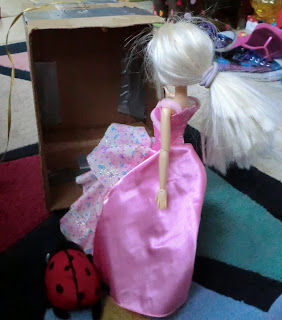 |
| A seven year old (photo by Tiana) |
Yesterday afternoon after picking A up from ballet, we drove an hour west to visit my brother, sister-in-law, niece and nephew who have recently moved to our neck of the woods. About ten minutes into the drive, B announced excitedly, "I got it! I was able to reach it without unbuckling my seat belt!" "Reach what?" I asked somewhat distractedly. "A quarter!" Do you remember the joy of finding a quarter when you were nine? Good times, right? Only until K registered what B had said because at that point she declared the quarter hers, claiming she had lost it weeks ago. Needless to say, none of us believed her. At which point, K burst into tears. K tends towards the dramatic anyway, but this was a bit out of character for her. I calmed her down and then suggested that she close her eyes for part of the drive to Clarksville. Amazingly, she complied and was quiet for the next half hour.
The relative quiet gave me an opportunity to reflect on just why K was so tired. She was tired because the night before she'd been up until after nine, having gone to a Sounds baseball game and followed it up with ice cream from the new shop around the corner. Sadly, this was not an uncommon occurrence this summer - we've been keeping pretty late hours. Luckily that has meant late mornings as well, but K's mini-meltdown reminded me that she is only 7.
She's only 7, but she's the youngest in the family, so she's not really treated like she's 7.
I think our family functions more based on the median age of our children, not our children's actual ages of 11, 9 and 7. I plan and execute activities based on what will keep the girls happy, occupied and engaged. But I base most of this on a relative age of approximately 9 - B's age, not K's. After the birth of a new child, I think a family (or maybe this is just our family?) is pretty centered on what's possible for the age of the newest family member. That holds true for a few years - at least as long as naps are absolutely necessary. But after naps are a thing of the past, it's easier to begin to stretch that littlest girl to do things she might not necessarily choose on her own.
In a lot of ways, I think it's very good for K that she has two older sisters. She may have seen more museum exhibits, been to more events or tried more adventurous foods because she has older siblings. K is not one to hold back, so when she has a question about an exhibit, an activity or something she sees, she asks. And when she asks one of her numerous questions, she learns things. Having older sisters is helping her grown and learn. But I can see that it's also tiring her out a bit.
As I pondered the state of our family last night and my use of the median age of my children to center our family, I had an image of a spinning top. Using a median age, there's one family member plopped in the middle of the top and the rest of us are spinning around it, some of us holding on for dear life. (I've been a bit tired lately.) We're still a family unit, still functioning together, but perhaps not as smoothly as we might otherwise.
What's a better model? I think a wheel with four spokes and a center is likely a better model. That model gives each member equal weight, but allows the center to rotate amongst the family members. You can also spot a problem right away since a wheel with an off-kilter spoke isn't going to function properly. This image is a good one for me to keep in mind as we transition to a season in J's life that is going to require working longer, harder and smarter. We're going to have to share him more with his work and still keep the wheel of our family spinning smoothly.
I'd like to say that I saw K's tiredness and immediately took steps to get rest for her and for our family. That's only sort of true. She and her sisters spent the night with their cousins and then we did have a lazy day at home watching last night's So You Think You Can Dance and reading in bed together between piano and ballet sessions. But it was once again 9ish before the girls got into bed. And tomorrow we are going berry picking, which requires an early start.
I'm imperfect at this mothering thing. I sometimes see what needs to be done, but it takes me a while to get it done. Still worse, there are times when I don't even see the need right before me. My goal? To rest this weekend and free more days on the calendar next week. Progress, not perfection. And I hope that part of my progress moves us towards moving smoothly as spokes on a wheel and not as a top spinning out of control.














